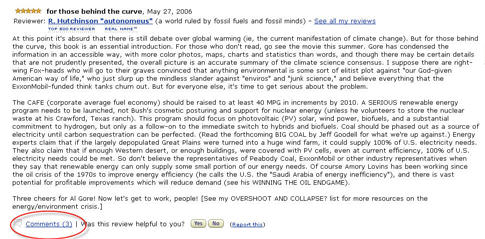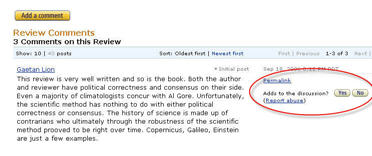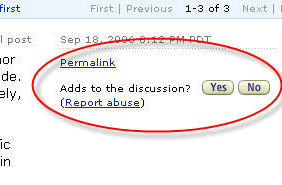If you’re going to post anything to the Yahoo time capsule, you’d better do it in the next 21 days. I just noticed this today, but it’s another cool form of human connecting. While there is no direct sharing going on between participants, it does give a sense of human connectedness.
Pilgrim Notes
Reflections along the way.
Category: Society & Culture (page 8 of 13)
In his 4th quarter Public Justice Report, James Skillen suggests that regardless of who wins what seats in the upcoming election little will probably change in Washington. First, he suggest voter apathy is high because “most voters seem to be aware that lobbyists have more power than they do, and that their vote won’t matter much. Many have also concluded that major problems won’t be solved by Washington, regardless of who wins election.”
Our current system is ill-equipped to solve the continuing stagnation in Washington politics, and Skillen believes that even the emergence of independents and third parties can do little to change the current atmosphere.
The problem? He suggests that our country desperately needs a system that represents the national interests because we are a nationwide community of citizens whose collective actions can have dramatic impact upon our culture and our world. Unfortunately, the system we have (and even independent and 3rd party groups) will not represent national interests but special interests groups. He proposes a focusing on building national parties:
What we need is something much more significant than election-campaign finance reform, or lobbying reform, or the growth of independent voters and representatives. We need a fundamental change in the electoral system that will help to produce national parties that are truly competitive and whose elected representatives will be answerable to party members and voters rather than to lobbyists. We need a system change that will lead to the representation of the real diversity of American voters in Congress and that will, thereby, draw voters out of their apathy into participation in elections and politics. We need 75 percent or more of voters to vote instead of 50 percent or less.
He continues with a proposal to change the way we elect representatives from focusing on districts to electing parties:
If each state eliminated all congressional districts and allowed any number of political parties (not only two) each to field a number of statewide candidates corresponding to the number of House seats to which the state is entitled, voters could then caste their votes for the party they really believed in. No votes would be lost as happens in a simple majority system. When the votes were tallied, each party would gain as many House seats as its percentage of the statewide vote entitled it, no more, no less. If the Republicans got 40 percent of the vote, they would win 40 percent of the seats. If the Democrats got 40 percent of the votes, they would win 40 percent of the seats. If the Libertarian Party, or Green Party, or Conservative Party won five percent of the vote, it would win five percent of the seats. If a Public Justice Party won 10 percent of the votes, it would win 10 percent of the seats.
Not only would such a system allow the diversity of American voters some real choices for a change, it would also compel parties in different states that share common principles and platforms to work together to build a national party. If all Republicans, or all Greens, or all Libertarians across the country did not bind themselves in a tight agreement about what they would aim to achieve when their elected representatives arrived in Washington, they would have no coalition of forces in Congress. This process would begin to force the emergence of truly national parties with national agendas. These parties would also have to decide ahead of time (and make public) which interest groups were supporting them and on what terms they would take those interest groups into account in their legislating. Voters would then be able to decide which party to support and would be able to help shape an overarching agenda for the party whose elected representatives would remain more accountable to its members and voters than to the interest groups.
Skillen believes this solution would do away with gerrymandering and hold officials to a greater level of accountability to national interests.
I still have to process Skillen’s proposal, but I am interested in the way he tackles the problems in Washington by suggesting it is a systems problem not simply a personnel problem. If anything, this could open a conversation about different ways to think about our current system; although I think most people would fear any tampering or changes to our current system.
I usually avoid politics here except for my recent drudge comment because our culture (both online and offline) seems unwilling to truly enter into dialogue about ideas and so often public discussion is more about hurling invectives between trench lines.
My biggest problem is the feeling that I don’t fit in either camp: Republicans or Democrats; conservatives or liberals. Growing up in East TN, I found my home among the Republicans and enthusiastically joined the College Republicans in the early 80s.
When I left college, I ministered at an Inner City church among the homeless and weakest members of our society. Many of my ideals were challenged.
I am still strongly pro-life, but I’ve tried to understand how that applies across the board: from birth to death (including death penalty, war, childcare, aging care, immigration and more). For me pro-life means being pro-person and trying understand how valuing each person should affect the way I view this world. This makes me feel disconnected from both parties, and yet at times finding points of agreement with either group.
Over the years, I’ve developed friendships with people from all walks of life and political (and/or non-political) persuasions. By practicing Buber’s idea of facing people and really listening, I find myself less willing to entrench myself in certain ideas.
This also makes me listen to competing views and honestly try to think through difficult issues like the Iraq war and other issues. As I listen, wrestle, discuss and even argue at times, I often find myself in that “undecided” black hole because these issues are never as simple as the pundits preach.
The current political landscape is tired and self-serving. So people like me struggle to wonder the value of even voting.
Simon Simeonov sees some interesting implications of Web 2.0 for E-Commerce. Here are three trends he observes:
1. First, expect a significant move to more interactive user experiences delivered through rich internet applications (RIAs). “The main goal will be reducing shopping cart & checkout abandonment…”
Doug thoughts: From a useability standpoint, I think most carts flunk. But newer AJAX models may solve the problems of way too many steps. As long as we can think human-centered and not just cool. Of course, the cart is fundamental for E-Commerce but there are so many other possibilities for RIAs.
2. The second trend is accelerating disaggregation, brought about by the dual forces of focusing on core competencies and leveraging network effects. … “The most successful services will reduce the barriers to purchase across sites.”
Doug thoughts: The interconnecting between sites and services is changing the landscape in ways that most companies cannot fully grasp yet. But it will most certainly change the way we understand brand and marketing.
3. The third trend is social commerce, which comes in two flavors: content-driven and interaction-driven, or passive vs. active. Combined with disaggregation, it means that social commerce will happen everywhere, not just on the e-commerce sites.
Doug thoughts: I think Netflix friends is one amazing example of on site social commerce.
Sick of working? Take a mental health day, using Call-In-Sick.
Here’s their spiel:
Call-in-Sick is a revolutionary new FREE service that allows you to call in your sick message to your boss or employer from anywhere, any time.
Picture the scenario: You stay out too late on a workday night and decide to call in sick the next day. The next day you drag
yourself out of bed at 5am because you know your boss won’t be there to answer the phone.
With Call-in-Sick you can record your sick message the night before then schedule it to be sent directly to your boss’s phone early in the morning without you even getting out of bed!
Nathaniel, one of my co-workers, sent this to me via Mike Yamamoto. Maybe nobody is buying my kidney transplant excuses and want me to come up with something fresh!
NYT announced today that Netflix is offering a $1 million dollar prize for the person who can improve their recommendation system by at least 10 percent. To help potential winners, they’re making available “to the public 100 million of its customers’ movie ratings, a database the company says is the largest of its kind ever released.”
I think this is pretty cool. It is more of the consumer generated content trend where companies look outside their walls to the public for help in creating solutions.
There’s only one political race that I’ve been following this year and that is the Lieberman-Lamont showcase showdown. And the only reason is that I think Lieberman is a decent guy that was completely hung out to dry on the basis on one issue. So I was delighted to read this little article on Lieberman today in The Stanford Daily.
I don’t normally mention politics here simply because our culture has moved far beyond any form of reasoned discourse or proper rhetoric. I think many of us Americans are not on the fringe waiting and wanting to virtually crucify the “other guy.”
There are real problems in our world and real disagreements as to how to solve those problems. If we could ever learn to listen and really dialogue (Martin Buber), we might actually find places of wisdom that teach us to avoid killing each other (virtually or literally).
Apparently YouTube is getting ready to be sued into oblivion. At least that’s what Mark Cuban believes. According to Reuters,
“There is a reason they haven’t yet gone public, they haven’t sold. It’s because they are going to be toasted,” said Cuban, who has sold start-ups to Yahoo Inc. and CompuServe.
Dang! I was just starting to like YouTube. One minute they’re the fastest growing video sharing site in the world and the next minute they’re a burned up piece of bread from yesterday’s breakfast.
I actually think there’s potential to find a way to keep the irreverent and diverse user-generated content while still making peace with copyright holders and even welcome more commercial entities.
Well here’s hopin’ Cuban is just showboatin’ and the zany world of YouTube keeps growing and shocking.
My wife sent me a great Fast Company article on how several top tech executives manage their the overwhelming schedules. You can visit the article to read their stories, but if you want the bullets, here’s the skinny:
1. One size does not fit all. Cingular Wireless CEO Stephen Carter handles almost every incoming email in real time; Sun Microsystems EVP Marissa Peterson checks email just twice a day. When it comes to multitasking, no single solution works for everyone. Pick the tactic that’s best for you.
Doug Comments – I’m an NF, and I don’t know if this is true for all NFs but I cannot even follow the same process for extended periods. It helps me to change the way I do things every so often, or I feel like I get into a creative rut.
2. Paper piles only grow. When you get a paper report or memo, deal with it, then file it or hand it off. Piles of paper make for more work.
Doug Comments – My wife is an organizer, so I’ve heard this for almost twenty years! But I love stacks and stacks of paper and stacks and stacks of books careless thrown about on my desk. It’s not about a method for processing that info: I try to deal with stuff ASAP or flag in email so I will remember. But if I am working on a project, I need the clutter to help me create. Otherwise, I feel as blank as the desk.
3. Heading to a meeting? Go unplugged. When you meet with someone, you’re using a nonrenewable resource: your time. Don’t let cell-phone or pager interruptions waste it.
Doug Comments – Totally on board with this. I do not answer my phone when I am in conversation or meetings. The person in front of me receives top priority. The Amish have a handle on this. One reason they seem to reject technology is the destructive impact it can have on community. So a phone cannot be in the house because it will interrupt the importance of the people who are present (think: answering the phone during supper). There is one exception for me: the wife! Once we were at Walmart and I was talking with an old friend. My phone buzzed and buzzed and buzzed and buzzed, but I completely ignored it and focused on my friend. Suddenly my wife appeared. After looking for me for about twenty minutes, she was a minor bit frustrated. I learned my lesson: she takes priority!
4. The next killer business app? Instant messaging. IM is faster than email and just as inclusive. Its beauty lies in its simplicity. Think of it as the online equivalent of an elevator conversation.
Doug Comments – During the day, I work online all day: this is my contact point of choice!
5. Delegate: It’s the ultimate time-saver. Investing in frequent communications with your staff — lunch meetings, daily emails — yields big dividends. Your staff members can’t lighten your load if they’re out of the loop.Doug Comments – Good. In my ministry world, I am trying to learn this.
6. Working in hard-to-reach territories? Voice-mail it. Voice mail is more dependable than email and better for keeping globe-trotting executives emotionally connected with the home team.
Doug Comments – If you need to talk with them, make sure to leave times and phone number, when you are available to avoid the dang phone tag wars.
Amazon has added a comment functions on reviews. Users can comment on reviews, and then police comments. I will be interesting to see how well this takes off.



© 2025 Pilgrim Notes
Theme by Anders Noren — Up ↑
